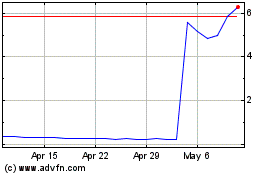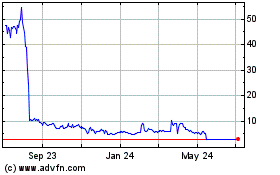Yield10 Bioscience Files U.S. Patent Application Covering New Technology Enabling Low-cost Production of PHA-based Biomateria...
June 17 2019 - 8:30AM

Yield10 Bioscience, Inc. (Nasdaq:YTEN), an agricultural bioscience
company that uses its “Trait Factory” to develop high value seed
traits for the agriculture and food industries, today announced
that the Company has filed a U.S. Patent application for new
technology enabling low-cost production of PHA-based
(“polyhydroxyalkanoate”) biomaterials in Camelina sativa, an
oilseed crop. PHA-based biomaterials are of significant interest
for their use in water treatment to remove nitrogen and phosphates,
and as a biodegradable replacement for petroleum plastics in a
range of applications.
The new Yield10 patent application describes a discovery around
maintaining the viability and vigor of Camelina seed containing
high levels of PHA biopolymer. This is an important step
toward realizing a cost-effective, seed-based production platform
for the simplest member of the PHA
family, PHB, using Camelina. With
this new patent-pending technology, Yield10 plans to develop
and commercialize products for water treatment applications using
the Camelina PHB platform. Yield10 is also seeking partners
interested in developing commercial opportunities for crop PHA
biomaterials in plastics replacements markets, where Yield10 would
expect to serve as a technology provider.
“While we maintain our focus on the development of novel yield
traits for commercial crops based on a licensing model, we are
working to develop independent market opportunities for Yield10 in
the specialty oils and niche crop space as part of our business
development activities,” said Oliver Peoples, Ph.D., president and
chief executive officer of Yield10 Bioscience. “We believe that by
developing the PHA Camelina platform as a cash cover crop, we can
create new sources of revenue for farmers, independent of export
markets, reduce run-off from fertilizer, and produce a natural
biodegradable product that can be used to reduce nitrate pollution
from aquaculture and septic systems. By focusing on the North
American market, we believe we can avoid the typical high costs and
long timelines associated with global deregulation of a biotech
crop, and potentially benefit from the ongoing modernization of the
USDA-APHIS regulatory process.”
Yield10 is a pioneer in the development of technology for
producing PHA/PHB biomaterials in crops. Seed-based PHA/PHB
production provides an opportunity to sustainably produce these
natural biodegradable materials at low-cost to disrupt the cost
advantage of the petroleum plastics they functionally replace.
Based on the Company’s internal engineering projections, the costs
achievable may also enable broad use of this material for water
treatment applications where it acts as a maintenance-free growth
substrate for bacteria that converts nitrate to nitrogen gas
reducing pollution and algal growth.
Over the last several years, Yield10 has developed Camelina as a
platform crop using it to identify, develop and evaluate the
Company’s pipeline of novel traits to enhance yield in commercially
important row crops such as canola, soybean and corn. Recent
discoveries by Yield10 for producing PHB in an economically viable
manner may also benefit from Yield10’s work to boost yield in
oilseed crops. Yield10 plans to begin testing PHB producing
Camelina plants in small field tests as early as the 2020 growing
season.
Background on PHA for Water Treatment
Scientific data has clearly shown that fertilizer (NPK) is
essential for global food security, however its use is also a major
source of nutrient pollution in our waterways. There is global
demand for development of sustainable, economically attractive ways
to reduce fertilizer run-off via simple and cost-effective methods
to remove it from water where it comes from multiple sources,
including septic systems. PHA has been successfully used to manage
algal growth in aquariums and ponds where denitrifying bacteria
present in the water feed on PHA pellets and use the energy to
convert the nitrate to nitrogen gas (78% of air is nitrogen). Once
the nitrate is removed, the algae will disappear. This market
application has been known since the 1980s, but its adoption has
been constrained by the high cost of producing material through
fermentation. There is significant potential to use Yield10’s PHA
Camelina platform as a sustainable, low-cost source of PHA
biopolymer to improve the overall sustainability of food production
and reduce nutrient pollution of our waterways.
About Yield10
Bioscience
Yield10 Bioscience, Inc. is an agricultural bioscience company
which uses its “Trait Factory” to develop high value seed traits
for the agriculture and food industries to achieve step-change
improvements in crop yield to enhance global food security. Yield10
has an extensive track record of innovation based around optimizing
the flow of carbon in living systems. The “Trait Factory” has two
components: the “GRAIN” computational modeling platform, which is
used to identify specific gene changes designed to improve crop
performance, and the deployment of those changes into crops using
genome-editing or traditional agricultural biotechnology
approaches. The purpose of the “Trait Factory” is to engineer
precise alterations to gene activity and the flow of carbon in
plants to produce higher yields with lower inputs of land, water or
fertilizer. Yield10 is advancing several yield traits it has
developed in crops such as canola, soybean, rice, wheat and corn.
Yield10 is headquartered in Woburn, MA and has an Oilseeds Center
of Excellence in Saskatoon, Canada.
For more information about the company, please visit
www.yield10bio.com.
(YTEN-G)
Safe Harbor for Forward-Looking
Statements
This press release contains forward-looking statements which are
made pursuant to the safe harbor provisions of Section 27A of the
Securities Act of 1933, as amended, and Section 21E of the
Securities Exchange Act of 1934, as amended. The forward-looking
statements in this release do not constitute guarantees of future
performance. Investors are cautioned that statements in this press
release which are not strictly historical, including, without
limitation, the Company’s ability to develop and commercialize a
seed-based production platform for PHB using Camelina as a
commercial business focused on water treatment applications, either
by itself or together with a partner; whether or not the patent
application described above will result in an issued patent;
whether the PHA Camelina platform can be developed to create new
sources of revenue for farmers independent of export markets,
reduce run-off from fertilizer and produce a natural biodegradable
product that can be used to reduce nitrate pollution from
aquaculture and septic systems; and whether anticipated regulatory
pathways will result in any cost savings or other efficiencies in
the development of this platform, constitute
forward-looking statements. Such forward-looking statements are
subject to a number of risks and uncertainties that could cause
actual results to differ materially from those anticipated,
including the risks and uncertainties detailed in Yield10
Bioscience's filings with the Securities and Exchange Commission.
Yield10 assumes no obligation to update any forward-looking
information contained in this press release or with respect to the
matters described herein.
Contacts:
Yield10 Bioscience:
Lynne H. Brum, (617) 682-4693, LBrum@yield10bio.com
Investor Relations: Bret Shapiro, (561) 479-8566,
brets@coreir.comManaging Director, CORE IR
Media Inquiries: Eric Fischgrund, eric@fischtankpr.com FischTank
Marketing and PR
Yield10 Bioscience (NASDAQ:YTEN)
Historical Stock Chart
From Mar 2024 to Apr 2024

Yield10 Bioscience (NASDAQ:YTEN)
Historical Stock Chart
From Apr 2023 to Apr 2024
